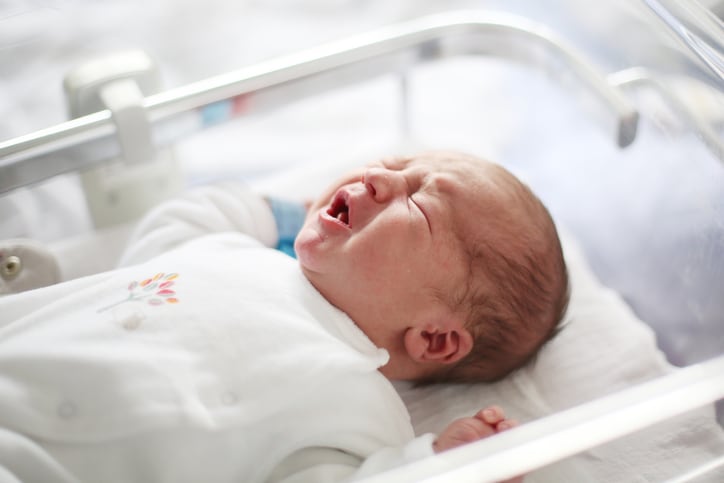The in vitro study explored the bifidogenic activity (enhancement of the growth of bifidobacteria) of a heat-killed vaginal strain (Limosilactobacillus vaginalis BC17), in addition to the assessment of its safety, finding: “Limosilactobacillus vaginalis BC17 heat-killed cells proved to be active in stimulating bifibacteria and counteracting pathogens growth.”
The authors from Bologna, Italy, developed a functional formulation concept for infant oral intake, concluding: “This present research deepens the potential of postbiotic agents in the perspective of infant microbiota shaping, without neglecting important safety issues."
Significance
An infant's microbiota influences their well-being and is suggested to be the basis for long-term health.
At birth, infants come into contact with various microorganisms that colonise their mucosae, the soft tissue that lines the body's canals and organs in the digestive, respiratory and reproductive systems.
Newborns delivered vaginally show high levels of Lactobacillus in the mouth, skin, and gut; in particular, the composition of gut microbiota resembles the vaginal one and is dominated by lactobacilli followed by Sneathia and Prevotella spp..
Children born via caesarean-section (C-section) can show low microbial diversity in the gut and Staphylococcus dominance, which have been related to an increased risk of developing various disorders, including asthma, juvenile arthritis, and inflammatory bowel disease.
Human milk oligosaccharides (HMOs) delivered by breast milk can selectively shape the infant gut microbiota, favouring the colonisation of Bifidobacterium spp..
The authors of the current study therefore hypothesised that supplementation with beneficial microbes of vaginal origin in infants born via C-section or fed with formula could represent a valid strategy to drive the correct gut microbiota shaping.
They note however that the safety of probiotics and functional strain profiles is a fundamental issue, along with demonstrating the ability to confer health benefits to the host.
They explain that oral consumption of live probiotics is not risk-free, as cases of systemic infections have been reported in vulnerable patients and paediatric populations, and a proposed increased possibility of antibiotic resistance genes acquisition.
The authors note: “Even for well-known probiotics, such as strains belonging to Lactobacillus and related genera, a thorough analysis and understanding of potential risks must be undertaken, especially regarding antibiotic resistance.”
The European Food Safety Authority (EFSA) periodically reviews the list of microorganisms considered as QPS (Qualified Presumption of Safety) and defines the guidelines for strains to be included in food products.
Postbiotics are garnering attention for the reduction of risk in using live cells, as they offer the possibility to maintain functionality while improving safety profiles and reducing potential risks, especially those related to the transfer of genetic elements bearing antibiotic resistance.
Therefore, the authors aimed to analyse the genomic features of the vaginal strain Limosilactobacillus vaginalis BC17 and to characterise the bifidogenic and antipathogenic effect of heat-killed cells.
The study
L. vaginalis BC17 was isolated from a vaginal swab collected from a healthy pre-menopause Caucasian woman and was sequenced by Nanopore technology, highlighting the absence of antibiotic resistance genes and virulence factors and indicating the strain safety profile.
Values of minimum inhibitory concentration (MIC), the lowest concentration of an antibiotic that inhibits the growth of a given strain of bacteria, confirmed that L. vaginalis BC17 is susceptible to widely employed antibiotics.
However, after L. vaginalis BC17 was heat treated the heat-killed BC17 (HK-BC17) cells were found to significantly enhance the planktonic growth of Bifidobacterium spp.
Results also indicated that the presence of HK-BC17 effectively increased the formation of biofilm biomass of all bifidobacteria considered (p < 0.05), with an average biofilm formation of 192% compared to the control.
Additionally, the viability of bifidobacteria was enhanced when biofilms were formed in the presence of HK-BC17 (p < 0.05), with an average biofilm formation of 209%.
The lyophilized heat-killed BC17 cells were formulated in a sunflower oil suspension (1010 heat-killed cell/g) providing optimal re-dispersibility, stability, and bifidogenic activity even after pre-digestion in acidic conditions.
The authors conclude: “HK-BC17 was found to reduce the proliferation of an opportunistic (i.e., E. coli SO107) and virulent gastrointestinal pathogens (i.e., ETEC, S. enterica and Y. enterocolitica) with inhibition percentages up to 58%.
“We also highlighted anti-biofilm activity against the same pathogens: a significant reduction in biofilm formation and dispersion of pre-formed biofilms treated with HK-BC17 were observed.”
They do however note that the data suffers from in vitro experimental limitations.
“Further investigations using microbial communities, gut-simulated models, or in vivo models are needed to translate the results in complex systems with the ultimate aim of proposing the HK-BC17 oil suspension as an effective agent for the sustainment of bifidobacteria proliferation in the infant gut tract.”
Journal: Nutrients
https://www.mdpi.com/2072-6643/15/20/4433
“Limosilactobacillus vaginalis Exerts Bifidogenic Effects: A Novel Postbiotic Strategy for Infant Prebiotic Supplementation.”
Authors: by Barbara Giordani, Carola Parolin, Angela Abruzzo, Claudio Foschi, Antonella Marangoni, Barbara Luppi, and Beatrice Vitali.


